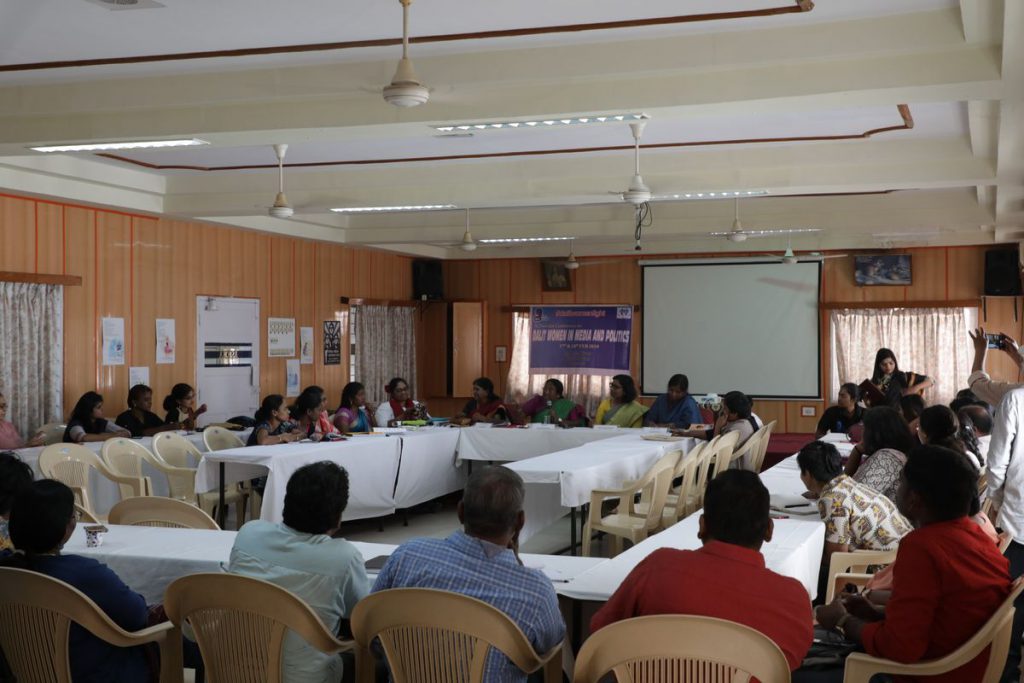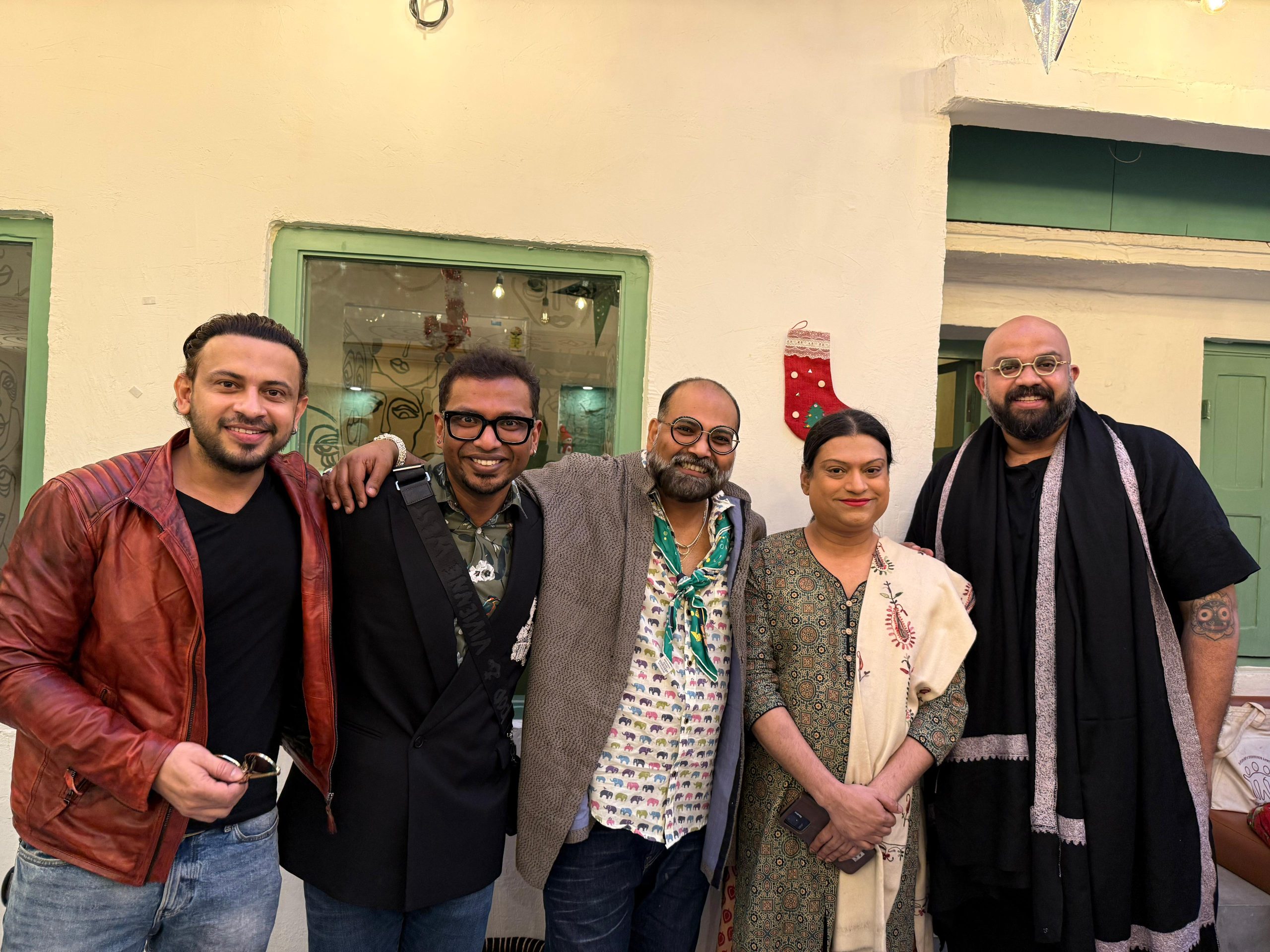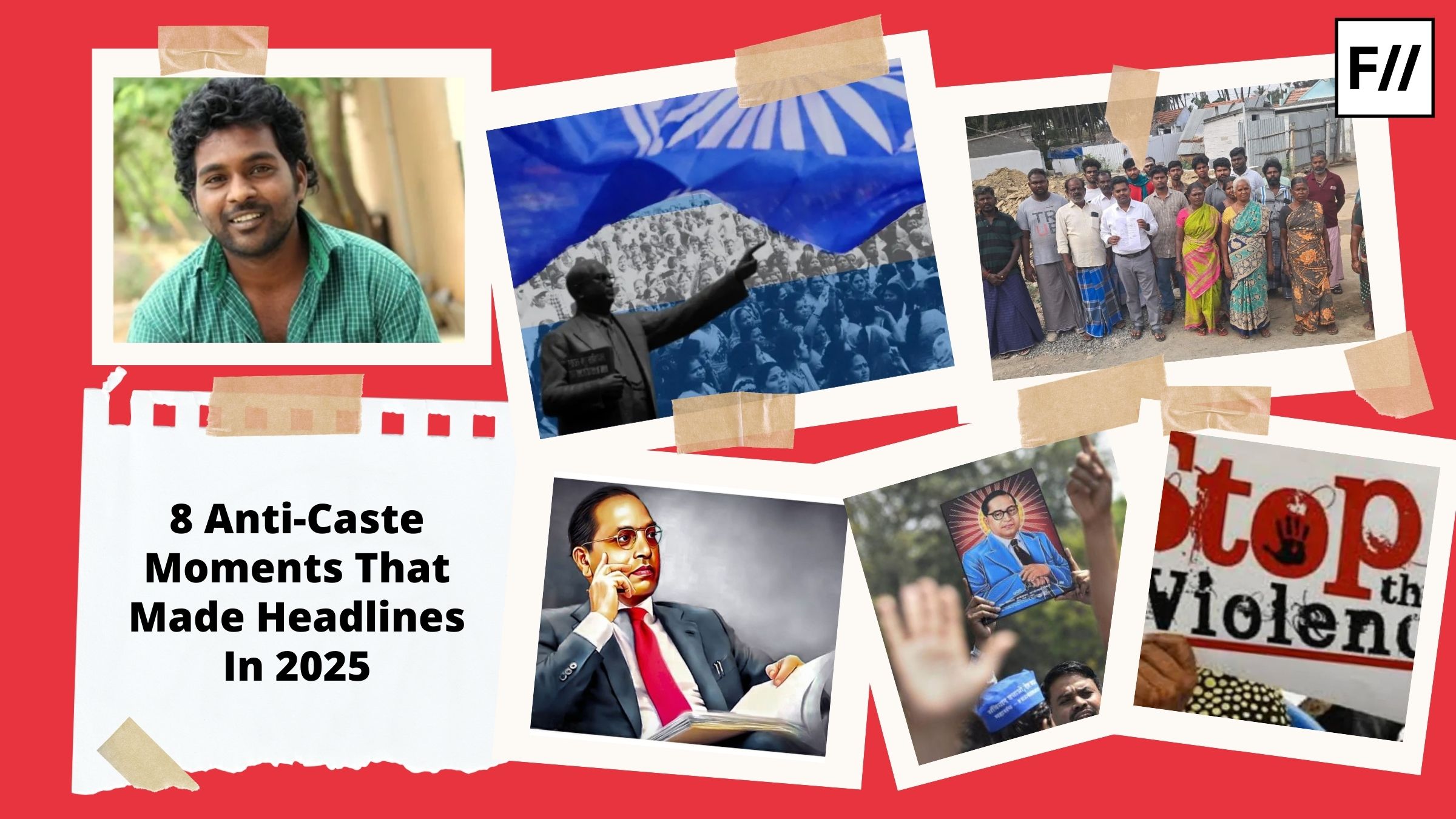In a time and in a country where an all-male delegation is chosen to meet the Prime Minister and discuss problems in the entertainment industry – especially in the wake of the #MeToo movement – an all-Dalit women panel is nothing short of revolutionary.
On 18th January 2019, the All India Dalit Mahila Adhikar Manch (AIDMAM) and The Blue Club (TBC) jointly organised a two-day event called Dalit Women in Media and Politics.
Dalit Women in Media
The first day was focussed on media. Short films directed by young Dalit women were screened along with AIDMAM’s documentary on the plight of Dalit women all over India. There was a Q&A session following this. Dalit activist Gowthama Meena’s moving video interview was also played.
The highlight of the day was the rousing speech by Dalit lyricist Uma Devi about the urgent need for more Dalit women to be involved in the field of media and entertainment.
“There are several stories within us. These stories aren’t being talked about, written about, or being screened. Because more often than not, we don’t get the opportunity to spread our stories because we are busy securing our next meal. This needs to change,” she said. She went on to talk about her personal experiences in the field and said it was important that they built each other up.
She also talked about the prevalent trend of movies which claim to represent marginalised communities but end up just being trauma porn. Uma Devi said, “When I say we need more Dalit stories on screen, I don’t mean stories of our trauma. We hold within us stories of joy, of celebration, and of triumph. I want to see those stories on the big screen.”
Dalit Women in Politics
The second day saw a congregation of several pioneering Dalit women who have contributed immensely to the contemporary anti-caste movement. Ruth Manorama was the keynote speaker and the panelists were Asha Kowtal, Sujatha Surepally, Cynthia Stephen, Gowthama Meena, Semmalar Jebaraj, Aishwarya Rao, Vedhanayagi, Grace Banu and Bhavani Ilavenil. The panel was moderated by Priyadharsini.
The truly wonderful thing about the panel was how pertinent yet diverse the selection of panelists was. Ruth Manorama is an activist and politician who has worked a lot with the unorganised labour sector. Asha Kowtal is the general secretary of AIDMAM and has also worked with women from North-Eastern India and on incorporation of tribal and Dalit women in governance roles. Sujatha Surepally is an activist and active politician. Cynthia Stephen is a social policy researcher and journalist. Gowthama Meena is a grassroots activist. Semmalar Jebaraj is a professor at Loyola College. Aiswarya Rao is a disability rights activist and doctor. Vedhanayagi has made several strides in agro-feminsim. Grace Banu is a Dalit and transgender activist. Bhavani Ilavenil is a writer. Priyadharsini is a filmmaker and journalist.
The panel covered multiple fields and social backgrounds even within the Dalit women community and that’s laudable, considering that even an event as large as The Hindu Lit for Life didn’t have a single panelist with a disability or enough LGBTQIA+ representation.
Lack of Financial Support
One of the major obstacles that most of the panelists said they face in the field is the lack of financial support.
“Women need money. Parties and sponsors don’t want to spend money on women, they don’t think it will bring returns. I believe the State must give special funds to the women in politics. Yes, give us the one-third seats reservation. Let us come into politics through that. After that, to sustain ourselves and go higher, we need money. We also needs reforms which put a bar on the amount of money parties are allowed to spend on campaigning. Invest in us. Invest in women. Invest in women from marginalised communities. I appeal to all organisations: multilaterals, bilaterals, Christian agencies. Provide us resources to help us move forward.”, said Ruth Manorama.
This is a valid point considering how much money legacy politicians tend to have. Even for men starting out without any connections or background in politics, money is of the utmost importance. For Dalit people, who have one of the highest poverty rates, this problem is augmented. Especially for women, as Ruth Manorama pointed, there is a huge lacuna in terms of money. So one can only imagine how difficult it must be for Dalit women.
Women of ‘Loose Morals’
The first attack made on an opponent in the field of politics, when the opponent is a woman, is character assassination, according to Sujatha Surepally.
“A ‘good woman’ cannot be a politician. A ‘good woman’ needs to be home taking care of her kids, or have a 9-5 job and get home early. So being in politics naturally makes you vulnerable to having the reputation of a woman with ‘loose morals’. I say, let’s be ‘bad’ women. Let’s set ‘bad’ examples. There is no other way to move forward.”, says Sujatha.
Also read: Why Are We So Obsessed With The Personal Lives Of Female Politicians?
This is a sad reflection of the fact that our society believes the worst thing a woman can be is sexually autonomous. We are so afraid of sexually empowered women that the slightest rumour of a woman exercising her sexual agency is enough for us to not let her come to power.
Filling the ‘Caste Quota’
“When I started to actually speak about caste issues, I started losing support. I was told over and over again that I can’t really achieve anything within politics because I’m a Dalit. They told me the only reason any party took me on board was to fill their Dalit quota. It’s sad how we are expected to just give them our token presence but aren’t allowed to try to affect change.”, says Sujatha Surepally.

“They invite me onto panels just because they want a good speaker. ‘Oh Ruth Manorama, you speak so well. But what I am allowed to speak about is limited. I make sure I send in notes about various issues and hope that at least one of them is addressed.”, says Ruth Manorama.
It’s high time we bring caste issues – and especially the discourse on the intersection of caste and patriarchy – into mainstream policy discussions.
LGBTQIA+ People and Politics
“There is caste everywhere. You would think that within an already highly discriminated against community, there wouldn’t be further prejudices among themselves. But even within transgender communities, most people who end up having to beg or do sex work are Dalit women – and there are several social and economic factors involved.”, says Grace Banu.
The number of openly queer politicians can be counted on one hand. The reasons for this are several, the primary being that we as a country are too afraid and/or disgusted to talk about queerness. When it comes to Dalit people, the situation is worse because their access to resources is limited too, due to socio-economic factors.
“If caste didn’t exist everywhere, how is it that upper caste transgender women get assigned high positions and given public attention, while for Dalit transgender women who work heavily on the grassroots level, getting into politics and building a career there remains a pipe dream?”, asks Grace Banu.
Disability and Politics
“We talk about marginalisation. Women are marginalised. Within women, Dalit women are further marginalised. That is twin marginalisation: through caste and patriarchy. I would like to point out another form of marginalisation that we seldom talk about: ableism. We have conversations about discrimination on the basis of caste, religion, gender. It’s time we discuss about discrimination based on ability.”, says Aiswarya Rao.
The issue of disability is exacerbated when we consider caste and disability together. Aiswarya Rao further explained – “According to the Government of India, 2011 statistics, 2.2% of the population – roughly 3 crore people – are disabled. But a lot of organisations have claimed that the actually number is close to 7-8% of the population, which is about 10 crore people. This is a large constituency but no one seems to care about. An even more interesting statistical data is that 35-45% of the disabled people are Dalits. Being Dalit is a very high risk for disability.”
Even the discourse on just disability is abysmal. In such a scenario, conversation and tangible change with respect to caste and disability may be considered hoping for too much by some people. But it’s imperative we start somewhere.
Non-Solidarity of Dalit Men
“What was truly terrible was how even Dalit men didn’t want Dalit women to achieve something substantial in politics because they always have the nagging thought of ‘if she comes in, where will I go?’”, says Sujatha Surepally.
A common thread of conversation among the panelists was the betrayal they feel over how even Dalit men don’t want Dalit women to move forward because the metaphorical seats for Dalit people in general is so limited, that Dalit men, aided by patriarchy, try to have a stronghold over those limited seats. They also talked about how even in constituencies with a large number of Dalit people, it was hard to win, because the casteism and misogyny is internalised to that extent. The panelists brought attention to the importance of radicalisation of such Dalit people and the need for solidarity within the community.
Also read: Dalit Women Speak Out, And How! – Not Just A Conference, But A Celebration
Featured Image Credit: Rucha Chitnis (via YES! Magazine)
About the author(s)
Hamsadhwani is a law student and anti-caste socialist feminist. Abolish the conditions that produce the prison.




